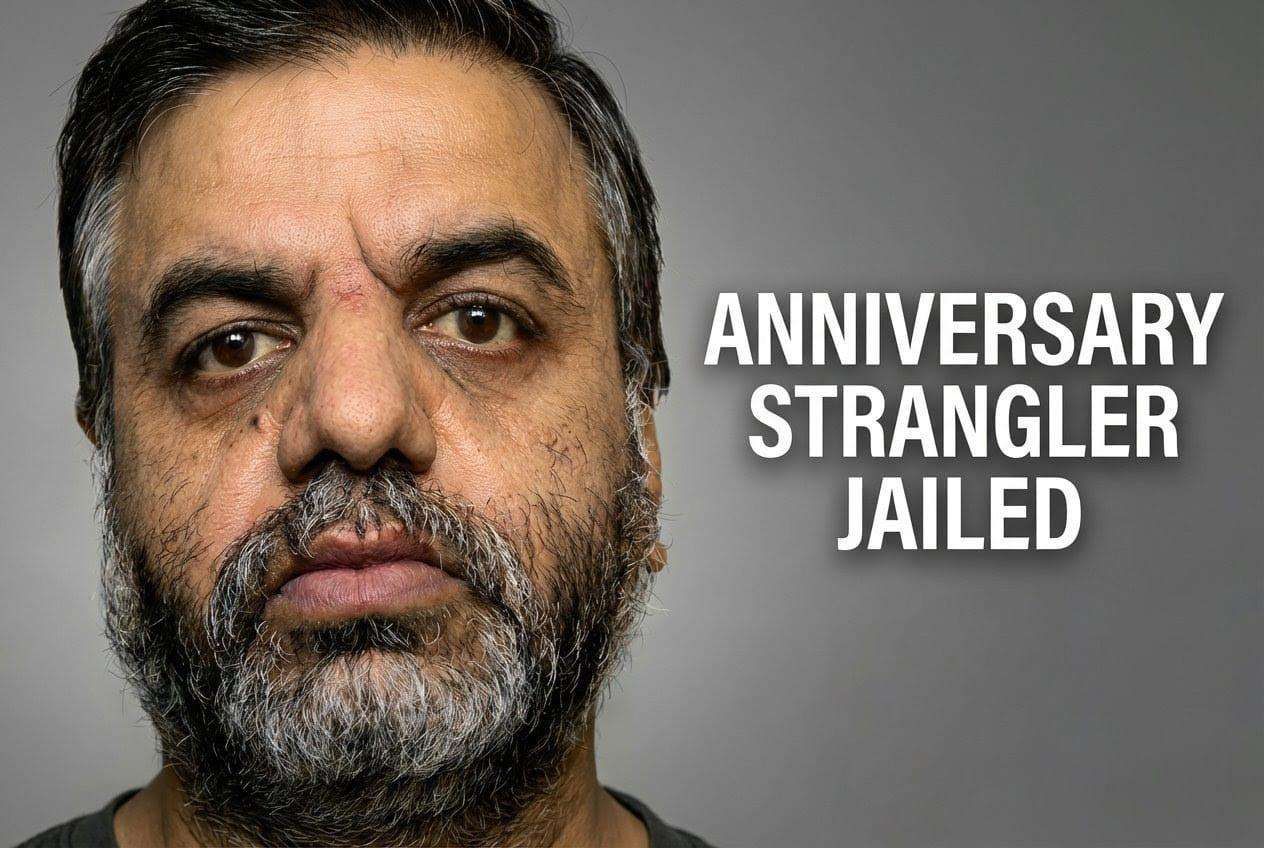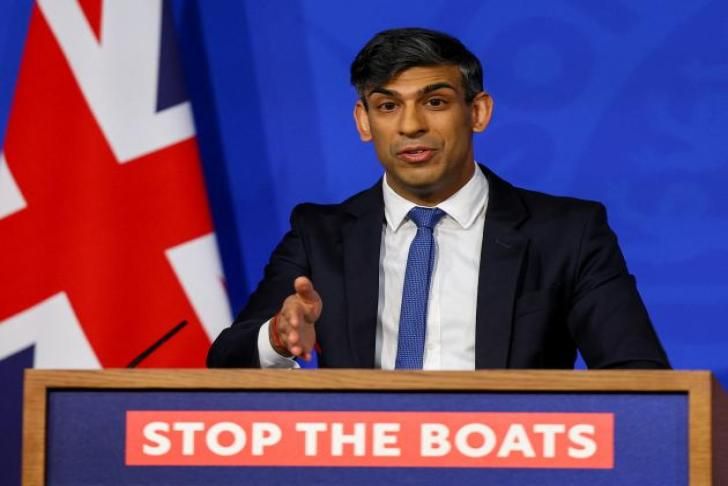Robert Jenrick, the former immigration minister under Rishi Sunak who resigned in December 2023 because to government legislation in Rwanda, has presented a groundbreaking new paper with a fellow Tory on how to "take control" of the UK's immigration crisis.
The MP for Newark, who on December 6 said the PM's emergency Rwanda bill did "not go far enough", has given Mr Sunak 36 recommendations for curbing migration and getting it to the tens of thousands.
In the report, co-written by fellow Conservative MP Neil O'Brien and Centre for Policy Studies Research Director Karl Williams, the scale of Britain's immigration nightmare is spelled out.
The trio writes: "Since 2010, 10 million people have moved to the UK, and 6.3 million have left, meaning net migration has added 3.7 million to the population. That is the equivalent of the populations of Edinburgh, Leeds, Sheffield, Nottingham, Stoke, Bristol and Cardiff put together, or more than the entire population of Wales."
They add: "You do not need to be particularly sceptical about the benefits of migration to think that the rates seen in recent years have been far too fast. And although migration is forecast to slow a little, it is projected to remain at historically unprecedented levels."
The report advocates reducing net immigration into Britain to the "tens of thousands", as promised by former Conservative prime minister, now Foreign Secretary, Lord Cameron.
It adds that Britain should become the "grammar school" of migration, taking in only the brightest and best.
1. "We should reaffirm a national commitment to reducing net migration to the tens of thousands - the target under David Cameron. This is possible now we have left the EU."
2. "We need to be more selective in who we permit to live and work in the UK. We should be the grammar school of the Western world, so that the overwhelming majority of migrants are net contributors to the public purse."
3. "As a backstop to a more selective system, we should institute an annual cap or lock on each individual visa route, which should be set by Parliament under a 'Migration Budget' process.
"This dual approach, combining a more selective system with a series of caps, will allow us to filter for quality while still retaining control over overall numbers. Experience shows that demand to move to the UK is enormous and increasing all the time, and that the British state virtually always underestimates this demand.
"If our routes are openended then they are beholden to global fluxes in migratory trends: a cap is the only way that government can guarantee to meet a promise to reduce immigration."
4. "Immigration needs to be explicitly linked to skills policy. Any exceptional relaxation of visa rules for particular job types needs to be based on clear, funded commitments from the respective sector to train UK workers, backed by the relevant Government department.
"This will change incentives across industry and Whitehall, while helping to fix Britain's skills problems."
5. "We should institute an annual Migration Budget, organised by the Secretary of State and delivered to Parliament, underpinned by a report akin to the Red Book, with votable resolutions (analogous to Budget Resolutions) covering each of the main migration routes. This will enhance transparency and accountability around migration-related decision making."
6. "The annual 'Migration Book' for the Migration Budget should pull together data from across all relevant departments, looking at the demographic and fiscal footprint of migration forecasts, but also modelling other key considerations such as the net impact of each official Migration Budget on housing, infrastructure and access to public services."
7. "We should expand the remit and resources of the Migration Advisory Committee so that it assists in the preparation of the 'Migration Book' by feeding forecasts to the Secretary of State."
"It should also be a watchdog for the Migration Budget. As it stands, the MAC is a valuable institution, but there is only so much a small panel of experts can do by themselves, even with a Civil Service secretariat supporting them."
8. "We should update the terms of reference in the 'MAC Framework Document' so that the MAC is required, in its annual reports, to provide analysis on how to get net migration down to the tens of thousands, and once we have achieved this, what must be done to keep it at this level."
9. "We need to split up the Home Office and create a new Department of Border Security and Immigration Control, which should be a Cabinet-level position (the rest of the department would form a Department for Policing and National Security).
"This would be an opportunity to instil a totally different culture in the Home Office, with new personnel and processes. We would then have both a Secretary of State and a bureaucracy dedicated to delivering for the public on this vital issue."
10. "The ONS has discontinued publication of UK population estimates by country of birth and nationality. Fixing the data issues underlying this decision needs to be a top priority supported by ministers in the Home Office (and subsequently the Department of Border Security and Immigration Control) and elsewhere."
11. "Throughout this report, we have cited data released by Government departments in response to FOIs or written questions in Parliament. In the interest of transparency and better analysis, the Government should commit to publishing these datasets on a regular basis, via gov.uk, as the Home Office does with visa data."
"This includes data on earnings and National Insurance registrations by nationality and country of birth, and data relating to Foreign National Offenders (FNOs)."
12. "We need to improve the evidence base for migration budgeting by integrating migration and population data across government, and introducing consistency in data collation across the public sector. In particular, we need to collect and link up data according to migration status, nationality and country of birth."
13. "The beefed-up MAC should lead a cross-Whitehall project to better understand the impact of migration. Part of this will involve producing lifecycle analysis of the fiscal impact of different profiles of migrant (according to nationality, age, work and so on), as Denmark and the Netherlands already do.
"But the project should also look at data relevant to the broader economic impacts of migration, for example on housing and infrastructure. This ongoing project would inform the annual Migration Budget."
14. "We should use this integrated data to conduct multi-generational longitudinal studies of migration and its impacts, looking at how the descendants of different cohorts of migrants have performed relative to each other and the population baseline.
"This should be based on hard data such as educational attainment, economic outcomes and crime statistics."
15. "We should accept the MAC's recommendation to abolish the Shortage Occupation List (SOL) altogether, rather than just creating a new, opaque Immigration Salary List (ISL). A time-limited exception could be made for NHS work, until the NHS Long Term Workforce Plan ramps up."
16. "As we shift the mix of our immigration system in a more selective direction, we can raise this cap (without compromising on salary thresholds and other requirements). In the meantime, we should prioritise doctors and other skilled healthcare workers on this route, until the NHS Workforce Plan can ramp up."
17. "The salary threshold for the skilled worker route that comes into effect from April 2024 should automatically rise in line with inflation (as should any other thresholds in the system - spousal visas for example). Before the Government announced the new threshold, it had fallen by 16 percent in real terms since its introduction."
18. "Schoolteachers have been exempted from the higher salary threshold implemented earlier this year, needing instead to earn the minimum of the relevant pay range.
"As the starting salary for a new teacher is £30,000 (£36,745 in central London), the new threshold is irrelevant. We need to close this loophole."
19. "We need to abolish the automatic equivalency of the new 'international qualified teacher status' (iQTS) with QTS, and reverse the 2023 reform whereby teaching qualification from any country can be used to gain qualified teacher status. As elsewhere, we should select for quality - not least in terms of English language proficiency."
20. "As per MAC recommendations, we should rationalise the dozen or so niche, small-scale worker routes, and cap numbers at 24,000 in the short term. The total number of applicants is small but they take up an excessive amount of capacity in the Home Office and UK Visas and Immigration (UKVI)."
21. "This route is being systematically abused. To end the use of fake companies, we need to ensure all health & care visas are based on a genuine, evidenced vacancy, not a speculative one - and we should as a minimum insist the employer or agency has been CQC-registered for at least two years."
22. "We need to set the salary threshold for health & care visas above the National Living Wage, and ensure it remains there, so as not to encourage low salaries and undercutting of domestic workers."
23. "In order to aid in recruitment and retention of UK workers in social care, we should increase the minimum hourly wage in the sector by 20-40p, at the cost of around £475m-£950m to central government."
24. "We should impose an immediate cap on health & care visas at c.30,000 (roughly the number of visas issued to main applicants in 2021, and still five times higher than the number envisaged when the route was introduced as an emergency response to Covid).
"Over the next three years, we should gradually reduce this cap to 6,000 - the number envisaged by the DHSC when the route was set up. The cap should operate on a monthly basis and have a regional dimension to ensure harder to recruit to places do not lose out to London and the big cities."
25. "While the NHS Long Term Workforce Plan is an extremely welcome step in the right direction, it needs to be accelerated as fast as resources allow so more nurses and doctors are trained domestically. We should phase out specific professions from the health & care visa route as and when domestic training reaches appropriate levels."
26. "Given evidence of industrial-scale qualification fraud at various foreign institutions in response to Britain's new visa regime, we should move towards an approved whitelist of institutions whose qualifications render migrants eligible for health & care visas. We need more focus on quality."
27. "We should introduce an overall cap on sponsored study routes."
28. "We should abolish the Graduate route outright. Foreign students who want to stay in the UK should need to find graduate-level jobs that meet the salary threshold within a six-month grace period at the end of their studies.
"The MAC is conducting a review into the Graduate route - which it recommended against in the first place - but we should act immediately, ahead of the September 2024 and January 2025 start dates for university courses."
29. "The 30 percent discount to the occupation-specific salary threshold (and 20 percent to the general threshold) which applies to migrants aged 26 and under should be reduced to 10 percent, or abolished. At 10 percent, the discounted threshold would be near the level of the UK median salary (around £35,000), rather than substantially beneath the average."30. "We should make universities accountable for their international students: where there is evidence of sustained abuse (such as very high dropout rates, low attendance and a drop in academic standards) they should be struck off the list of licensed study visa sponsors. We should focus initially on reviewing the 18 satellite campuses of non-London universities in London, which are geared towards international students on Masters courses of dubious quality."
31. "We should substantially revise the International Education Strategy (IES), ending the arbitrary 600,000 a year target for the number of international students. The IES instead needs to focus on quality over quantity, as per the grammar school approach to immigration. This will also move the Education and Business Departments away from constantly calling for more migration while resisting attempts at selectivity and control."
32. "We need a greater diversity of higher education provision - in particular, some local universities, such as the 18 provincial universities with London campuses, should reorient towards educating and training the local or regional population, rather than trying to educate the rest of the world. Reducing the number of international students on poor quality courses might entail some pain for the sector - but we should not shy away from this."
33. "People coming through the family route are much less likely to have a positive economic impact than those coming through the work routes. We could either cap the family route or set a target to be met via changes to rules and thresholds such as those below."
34. "We should require firm evidence that couples have cohabited for at least a year as a prerequisite for a partner visa, in order to demonstrate that the relationship is real and sustainable. We do not currently have a cohabitation rule, and there is significant evidence of abuse at present, reflected in the number of dependants granted partner visas doubling year-on-year in 2023."
35. "We should end the loophole that allows people to bypass the financial threshold by pooling savings across families and communities. People must have evidence that they have had the required savings and earnings for at least 12 months prior to applying for a partner visa."
36. "An annual cap, set in consultation with local authorities, has now been legislated for in the Illegal Migration Act 2023. This needs to go ahead this year.
"Given the need to absorb pressure on the system from people who have used the routes so far - more than half a million since 2015, the highest level since WW2 - not to mention the cost of illegal migration on local authority resources, we think the cap should be set at a relatively low level for several years (although ultimately this will be up to Parliament)."








.svg)


